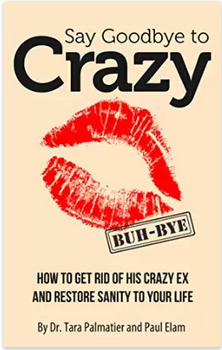 Is it okay to call your ex crazy? Not according to Men’s Divorce website. Their article, Stop Calling your Ex Crazy, admonishes men who call their exes crazy. But what if your ex is, in fact, crazy? Batshit banana pants crazy?
Is it okay to call your ex crazy? Not according to Men’s Divorce website. Their article, Stop Calling your Ex Crazy, admonishes men who call their exes crazy. But what if your ex is, in fact, crazy? Batshit banana pants crazy?
First, let’s distinguish between mentally ill, crazy and temporary painful emotional adjustments.
In many divorces, even divorces with non-personality disordered individuals, emotions can run high. Oftentimes, there’s anger, sadness, disappointment, resentment, bitterness and a desire to hurt one’s former “soul mate.” It’s to be expected, at least initially.
People who aren’t crazy eventually regain control of their emotions and consciously decide not to piss away their money on attorney’s fees and dial down the animosity for the sake of the children. In my work, the exes who are labeled crazy usually exhibit personality disorder characteristics (e.g., narcissists, borderlines, psychopaths, histrionics, dependents and paranoiacs). These are also the personality types that are commonly the driving force in high-conflict divorces.
High-conflict personality disordered people don’t regain control of their emotions. They go on a scorched earth campaign and deliberately try to inflict as much pain and damage as possible. They’re not just angry with their exes. They want to annihilate their exes.
Narcissists, borderlines and psychopaths conduct smear campaigns. They alienate the kids and to try to get their exes fired while simultaneously seeking maximum child support and alimony. They destroy property. They stalk their exes. They hack their emails and social media. They show up uninvited to gatherings like the funerals of former in-laws whom they hated and refused to visit throughout the marriage.
These are the people who lie outrageously and egregiously, and when caught in their lies tell even more lies. They make false allegations of domestic violence, child abuse and rape. They make multiple false children’s service reports and harass their exes by repeatedly calling the police to do wellness checks during their ex’s custody time. These are also the people who, after trying to have their exes arrested on false charges, don’t understand why their former spouses don’t want to reconcile or buy them cars, pay their mortgages or give them money to go on vacation.
If these behaviors don’t qualify as crazy, what are we supposed to call it?
It is crazy behavior. In fact, it’s nuts.
[*Not all narcissists, psychopaths and borderlines engage in the above behaviors. However, if someone has a history of these behaviors, chances are they’ve some kind of personality disorder. Having a personality disorder doesn’t excuse or exonerate any of these behaviors.]
The author of the Men’s Divorce article, Dan Pearce, concedes that calling an ex crazy when there’s “criminal behavior, abuse of any sort, addiction, or neglect are present” may be merited. What he doesn’t seem to understand is that not all abuse and criminal behaviors are overt. Oftentimes, abuse is covert.
Gaslighting, projection, no-win situations or double binds and the slow corrosive process of undermining your role as a parent and alienating the kids can all be difficult to quantify. Especially since most abuse victims neither recognize nor understand what they’re experiencing until it’s too late. Additionally, many abuse victims are told by their abusers that everything is their fault and they deserve to be treated that way.
Then there’s the crazy-making attitudes and rulings of the courts and custody evaluators. I’ve worked with men who were physically assaulted to the degree that they required medical attention, whose exes ripped court ordered breathalyzers out of car ignitions, who’ve had computers, phones, cars, gym equipment and other property destroyed — including one woman who hulked out and tipped over a two-person hot tub — and it didn’t factor into the court’s custody rulings whatsoever.
In every single case to which I’ve been privy where there’s been demonstrable criminal behavior and overt abuse, the abusers have claimed their victims are the abusers and that their criminal and violent behavior was justified. That’s crazy, too. When you’re on the receiving end of that kind of gaslighting and DARVO (Deny, Attack and Reverse the roles of Victim and Offender), a normal and understandable reaction is to call your ex’s behavior crazy because it is crazy.
Let’s address some additional points made by Pearce using his article headers.
“Crazy and opinion”
Pearce writes:
When you call an ex, of any kind, crazy, you are giving them power. You are telling the world that you misjudged this situation and that your thoughts and feelings in the world of romance are not as trustworthy as you previously thought.
In dismissing their mental capacity to sustain a relationship, you are condemning your own decision-making capabilities in the court of public opinion.”
Yes, exactly right! Most of the men and women I’ve worked with who’ve been married to Crazy admit the errors in judgment they made and the Red Flags they missed or ignored. They acknowledge how the codependency issues developed in childhood contributed to their vulnerabilities to relationships with narcissists, borderlines and psychopaths. They recognize the need to work on themselves, so they can choose better and have healthier relationships in the future. It’s part of the healing process.
There’s nothing wrong with admitting the role you played in your marriage and its demise. That’s what responsible, mature adults do. Understanding ourselves and our choices is essential to helping us grow as human beings and ensuring we don’t repeat our unhealthy relationship patterns. It doesn’t undermine our credibility as Pearce implies. Personal accountability increases one’s credibility.
“Crazy and communication”
Pearce continues:
Texting and social media messaging have made people think that everyone is always accessible all of the time, causing any time that passes before a response to be thoroughly analyzed. The misjudged feelings and miscommunication that unavailability can create has been known to cause people to act outside of rationality, allowing fear and anxiety to control behavior. . .
. . . They see their behavior as unjustified and themselves as blameless in this situation. They distance themselves from the responsibility of being in a relationship and take no ownership in its outcome. Those that are quick to label often are not able to see from the other person’s perspective. They feel that they would not have reacted this way if the roles were reversed or the behavior may not make sense to you.”
You mean like texting someone 179 times in a two hour period? Or receiving a string of threatening emails accusing you of not co-parenting because you decided to practice Low Contact due to your ex’s abusive and irrational behavior? This isn’t the fault of social media, cellphones and email. It’s about entitlement, an inability to self-soothe and poor impulse control. Most people who aren’t crazy don’t behave that way when the roles are reversed. We don’t go all Glenn Close in Fatal Attraction, “I won’t be ignored, Dan!!!!!”
Pearce adds:
The truth is that all human beings experience levels of ‘crazy’ at one point or another and behave in less than optimal ways once in a while. To throw around the label of ‘crazy’ is to discount those who actually suffer from the stigma of mental illness.”
We may lose our temper and say things we regret, but we take ownership of it and course correct. Crazy is rarely capable of that, which is why it’s important to be able to recognize people who behave in consistently crazy ways versus people who are behaving uncharacteristically crazy because they’re going through a difficult time.
As for suffering the stigma of mental illness — we’re supposed to be wary of people who are unpredictable, unethical, amoral, volatile, dishonest, self-destructive and destructive to others! Behaving in such ways should carry a stigma. Being a serial killer should carry a stigma. Molesting children should carry a stigma. Knowingly making false allegations of domestic violence to gain a tactical advantage in divorce or simply because you’re hurt and want to punish your ex should carry a stigma. Stalking and harassing someone should carry a stigma.
Willfully hurting others, regardless of whether the individual engaging in these behaviors has a mental illness or not, should carry a stigma. It’s one of the primary reasons people who are mentally ill actually seek help. Sometimes there are legitimate reasons to feel shame. Namely because they’re behaving in shameful ways. Removing that shame normalizes their behavior, which is incredibly irresponsible and dangerous.
“Functionality and sustainability”
Pearce continues:
In making yourself feel better by painting your ex-spouse in a worse light, you are taking functionality out of the equation of whether or not the relationship was sustainable. Interpersonal dynamics are not an exact science that dictates that specific types of people will always stay together or will always combust, and behavior and how we perceive it is about as subjective as you can get.
First, relationships, at least healthy reciprocal relationships, typically are not sustainable with an abusive personality disordered individual who engages in crazy behavior and dwells in an alternate, self-serving reality. They’re not fully functional people, so a relationship is impossible to sustain unless you’re a codependent who tolerates and enables your own abuse. Furthermore, a person who pathologically lies, cheats, perpetrates physical violence and engages in gaslighting, verbal cruelty, parental alienation and other forms of emotional abuse, puts themselves in a bad light. Identifying their aberrant behaviors is a vital part of extricating yourself from an abusive relationship. As it also affects their fitness to parent, it needs to be identified in custody cases.
Pearce contradicts himself:
In determining that an ex-spouse is ‘crazy,’ is ignoring how you may have behaved during the time that you were together.
Earlier in the article Pearce claims that calling your ex crazy highlights your poor judgment for entering into the relationship. At the end of the article, he claims identifying an ex’s crazy behavior ignores your part in the relationship. Which is it?
I don’t know in what field Mr. Pearce was trained, but refusing to examine one’s role in a divorce is often a telltale sign of characterological pathology. Most of my clients take responsibility and blame for things that aren’t their fault. It’s often an indication of codependence and having suffered abuse. My clients ask themselves if they’re the crazy ones because that’s what their abusers have told them repeatedly — especially when they have normal emotional responses like hurt, anger and betrayal as a result of being abused.
Pearce concludes:
It is understandable to want to negatively label an individual claiming half of your assets, claiming custody of your children, and requiring you to pay alimony and child support on a regular basis, but given the rationality that it takes to end a marriage, it is unfitting to dismiss your role in the end of a relationship, by ascribing the label of ‘crazy’ to an ex-spouse.
By doing so, you also are dismissing the severity of the challenges that individuals with mental illness face. It is better to accept responsibility in the part that you, as a member of the marriage or relationship, played in its end than to continue the toxic trends of shifting blame through name-calling.
Having to continue to financially support someone who’s abused you, who voluntarily makes themselves unemployed or under-employed, who vilifies you to your children and refuses to obey court orders is a very tough pill to swallow. Calling crazy behaviors crazy isn’t unfitting. It isn’t name-calling nor is it blame shifting, particularly when you acknowledge your mistakes as most responsible non-disordered adults do.
In fact labeling crazy behavior crazy is crucial especially if her mental illness gets you arrested on a false domestic violence report, she tries to get you fired or you need to seek the protection of a restraining order.
*Tell People Who Need to Know your Ex is Crazy, But Don’t Tell your Ex You Think She or He is Crazy
I advise clients not to use mental health labels when communicating with evaluators, judges, etc. — unless there’s an actual diagnosis. Describe the crazy behaviors and let the experts apply the labels. Say their behavior doesn’t make sense, is confusing, unpredictable, volatile — all descriptors that will help competent professionals draw their own conclusions. If they ask you if you’ve heard the term borderline personality disorder or narcissistic personality disorder, say yes, but be sure to add that you’re not a mental health expert, so it’s not your place to diagnose.
Crazy behavior is crazy and it’s okay to say so to your attorney, friends and family, or even your employer if your ex is threatening to get you fired by telling lies to your boss. Some of my clients’ employers have been included in restraining orders to protect them from being harassed at the workplace. It’s usually an uncomfortable conversation, but a necessary one. Explaining it to the kids when they begin to notice the crazy is a more delicate situation, but don’t invalidate the kids’ observations and normalize the disordered parent’s crazy behavior or call it love. Validate that it’s confusing and hurtful.
As for shouting at your ex that she or he is crazy or personality disordered, my advice is DON’T DO IT. They’re not going to have an epiphany and change their ways. They’re not going to admit their faults and flaws. Typically, they just project it back onto you sooner or later. You goal is to decrease the conflict, not escalate it. You do that by practicing the Three D’s: Detaching, Disengaging and Defending your Boundaries. You go No Contact if there aren’t any minor children and Low Contact if there are.
I also recommend you find an attorney who has expertise in high-conflict cases and understands what you’re going through, particularly the sense of injustice you feel during those times when Crazy gets away with being crazy — or, even worse, is rewarded for the crazy. Steer clear of smug, sanctimonious attorneys who encourage you to put the feelings, needs and rights of your abuser ahead of your own and ahead of the children’s feelings, needs and rights. If you want to do that you can stay married to Crazy.
 Counseling, Consulting and Coaching with Dr. Tara J. Palmatier, PsyD
Counseling, Consulting and Coaching with Dr. Tara J. Palmatier, PsyD
Dr. Tara J. Palmatier, PsyD provides services to help individuals work through their relationship issues via telephone or Skype, particularly men and women who trying to break free of an abusive relationship, cope with the stress of an abusive relationship or heal from an abusive relationship. She combines practical advice, support, reality testing and goal-oriented outcomes. Please visit the Schedule a Session page for professional inquiries.
 Want to Say Goodbye to Crazy? Buy it HERE.
Want to Say Goodbye to Crazy? Buy it HERE.
Hmm. You know that old chestnut about how it’s critical to define terms? Well, Pearce fails to do that. He’s so busy listing his examples of “not crazy” that he doesn’t define what *is* crazy. Does he believe genuine crazy exists? Or does he believe that false accusations of crazy far outnumber and outweigh (in terms of damage done) the instances of genuine crazy?
In any case, there’s tremendous minimizing, excusing, victim-blaming and even gaslighting going on in Pearce’s article, all because of that lack of proper proportion and failure to define terms.
Not calling genuine crazy to account, not pointing it out and defining it so that people know what it is when they see it, enables crazy.
Great job of fisking, Dr. T. You laid out the examples of genuine crazy & did not try to minimize or play the moral relativism game.
Funny picture BTW.
Hmm. You know that old chestnut about how critical it is to define terms? Pearce seems so busy listing his examples of “not crazy” that he doesn’t bother to list what IS crazy. Is that because he doesn’t believe genuine crazy exists? Or because he thinks that false accusations of crazy far outnumber and outweigh (in terms of damage done) the instances of genuine crazy?
Sadly, Pearce just makes things worse with this muddled article. To someone who is dealing with a genuine PD spouse, the advice Pearce gives, if taken, will only end up enabling the genuine crazy, and setting up the abused spouse for more punishment. I think I even spotted an example of gaslighting in Pearce’s piece. Arrgh.
Great job of fisking, Dr. T. Love the pic — cheeky!
Sorry about the double post above. My first comment got eaten — SO IT APPEARED … Captcha error message, page refresh, still no comment — so I rewrote from memory. Of course it turns up NOW, when the second comment posts. Full moon on the internet tonight?
Thanks, hexaphone. No worries about the double post. It’s been an unusually glitchy week electronics wise.
I agree with your critique of Pearce’s article, which is why I wrote a response to it.
Thanks for stopping by!
First off Im glad that I have found this blog, its helping me with my situation now.
What Pearce is saying is what I feel how most people in my area view narcissistic women in marriages. It feels like this phrase is used to help defend them and put more pressure and stress on the partner that they have.
With all the stress that they generate and bring to the table its hard NOT call them crazy to their face, and as soon as you do, then the court may look at you for being the abusive one.